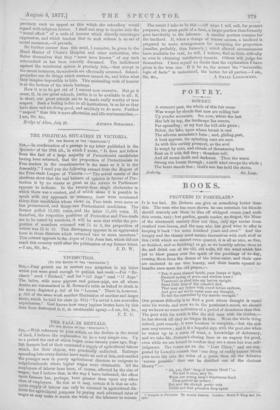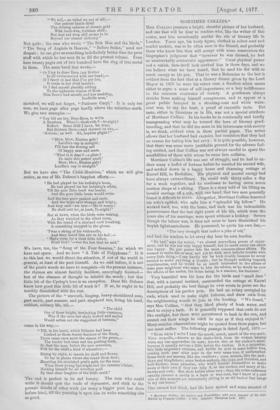BOOKS.
PROVERBS IN PORCELAIN.*
LC is too bad. Mr. Dobson can give us something better than; this. The man who has once shown he can entertain his friends,
should scarcely ask them to dine off whipped cream (and such- thin cream, too) ; but pardon, gentle reader, we forgot, the Muse of the nineteenth century does not dine, only sips nectar from crushed rose-leaves, and the man who has good wine to offer is keeping it back "for some hundred years and over." And the hungry and the thirsty must satiate themselves with such stuff as- this (with which we cannot even quarrel, it is all so nice, so fine,
so finished, and so finicking) or go, as we heartily advise them to. do, and drink out of the old, old wells, till the wind which has- yet to blow passes over the spirit of the poetlings of to-day, rousing them from the dream of the lotus-eater, and their eyes•
are anointed to see true beauty, and their hearts opened to breathe once more the old prayer,—
" Yet, 0 most blessed Spirit, pure lampo of light, Eternal' spring of grace and wisdom trew Vouchsafe to shed into my barren spright Some little drop of thy celestial dow,
That may my rymos with sweet infuse embrew, And give me words equal unto my thought, To toll the marveiles by thy mercie wrought."
Our present difficulty is to find a poet whose thought is equal unto his words, and were we In the pessimist's mood, we should say we know no surer indication of a period of decadence than this. The poet with his words is like the sick man with his clothes,—
he has shrunk till they no longer fit him. Were the whole thing indeed, past remedy, it were bootless to complain,—but the sick man may recover ; and it is a hopeful sign with the poet also when he wakes up to a sense of want, a knowledge of deficiency, and we take Mr. Dobson's closing lines as an augury for good, even while we are bound to confess they are a stern but true self-
judgment. The verses are on the "Lost Elixir," and are sug- gested by Lowell's remark that one drop of ruddy human blood puts more life into the veins of a poem than all the delusive
annuli potabile ' that can be distilled out of the choicest library
* Proverbs in Porcelain. By Austin Dobson. London: Henry S. King Elul Os. 1877.
Ah, yes, that 'drop of human bloodi'— We had it once, may be, When our young song's impetuous flood First poured its eostacy ; But now the shrunk poetic vein Yields not that priceless drop again. " We toil,—as toiled we not of old ;— Our patient hands distil The shining spheres of ohmic gold With hard-won, fruitless skill ; But that rod drop still seems to be Beyond our utmost alchemy."
Not quite ; the man who wrote "The Sick Man and the Birds," The Song of Angiola in Heaven," "Before Sedan," need not despair; he can give us something indefinitely better than the poor stuff with which he has seen fit to fill the present volume. Even here twenty pages out of two hundred have the ring of true metal in them. The same hand that wrote,—
" Or I try to draw Dora (my blotter Is all overscrawled with her head),—
If I fancy at last that I've got her, It turns to her rival instead ; Or I find myself placidly adding To the rapturous tresses of Rose Miss Dora's bud-mouth, and her madding, Ineffable nose,"
sketched, we will not forget, "Patience Caryl." It is only too true, we have page after page hardly above the valentine-mark. We give two examples :—
" You bid me try, Blue-Eyes, to write
A Rondortu. What 1—forthwith ?—to-night? Reflect. Some skill I have, 'tis true ; But thirteen lines,—and rhymed on two,— ' Refrain,' as well. Ah, hapless plight !"
"Blow, blow, Etesian gale Lucilla's cap is straight; Fill fast the flowing sail Of happy man and mate. What is it dear ?—a plate? Do taste this potted quail.' Blow, blow, Etesian gale ! Lucilla'e cap is straight."
But we have also "The Child-Musician," which we will give entire, as one of Mr. Dobson's happiest efforts :—
"He had played for his lordship's levde, He had played for her ladyship's whim,
Till the poor little head was heavy, And the poor little brain would swim.
And the face grow peaked and eerie, And the large eyes strange and bright, And they said—too late= He is weary He shall rest for, at least, To-night!'
But at dawn, when the birds were waking, As they watched in the silent room, With the sound of a strained cord breaking, A something snapped in the gloom.
'Twas a string of his violoncello, And they heard him stir in his bed Make room for a tired little follow, Kind God '—was the last that he said."
We have, too, the "Song of the Four Seasons," for which we have not space. And we have "A Tale of Polypheme." It is to this last we would direct the attention, if not of the world in general, at least of the poet himself. As we said before, it is not of the poet's words we have to complain—in the present instance, the rhymes are almost faultily faultless, annoyingly finished— but of the absence of thought to inhabit the words ; but this Little bit of the Cyclop's love is an exception. Does Mr. Dobson know how good this little bit of work is ? If so, he ought to be terribly dissatisfied with the rest.
The picture of the "uncouth, limping, heavy-shouldered man, part smith, part seaman, and part shepherd too, living his hard, =blest, solitary life, till,—
" The child One of those bright, bewitching little creatures, Who if she once but shyly looked and smiled Would soften out the ruggedest of features,"
-came in his way,— " Till, in his heart, which hitherto had been
Locked as those frozen barriers of the North, There came once more the season of the green,— The tender bud-time and the putting-forth, So that the man, before the now sensation, Felt for the child a kind of adoration ;— Rising by night, to search for shell and flower, To lay in places where she found them first ; Boarding his cherished goat's milk for the hour When those young lips might feel the summer's thirst; Holding himself for all devotion paid By that clear laughter of the little maid."
The end is perfect in its sad beauty. The man who could write it should quit the trade of rhymester, and stick to the prosaic details of other work ,(as many a bigger poet has done before him), till the yearning is upon him to write something else as good.



































 Previous page
Previous page